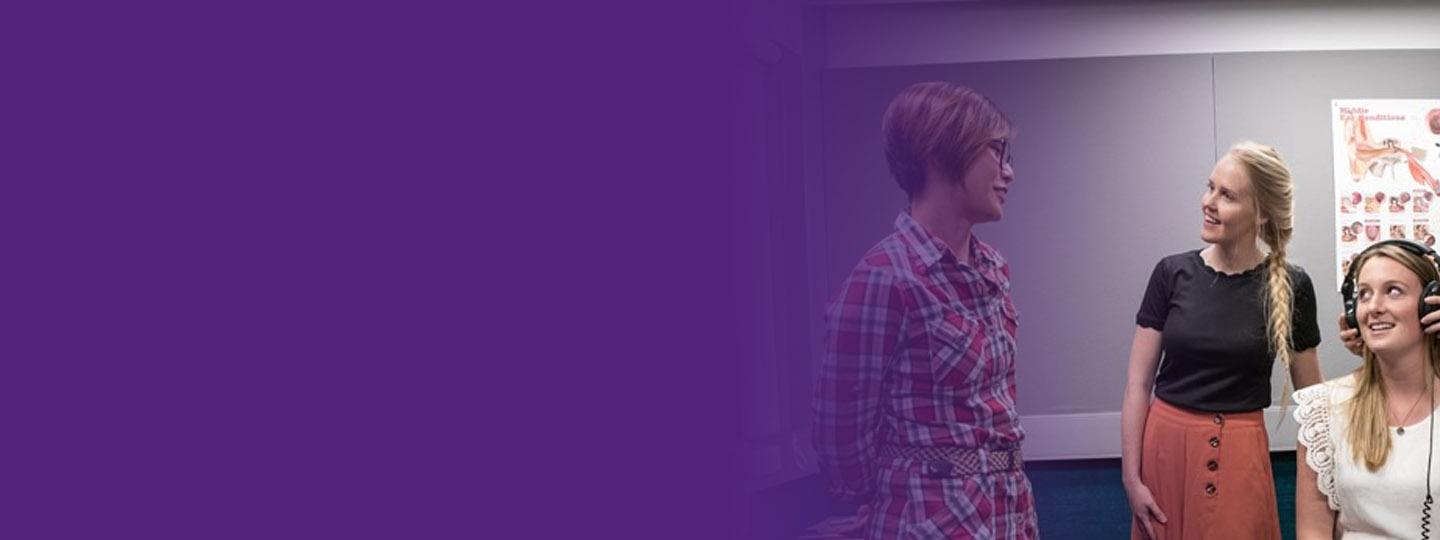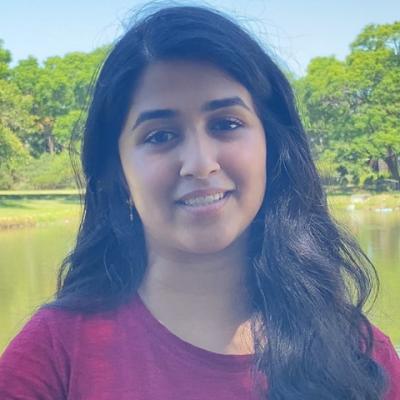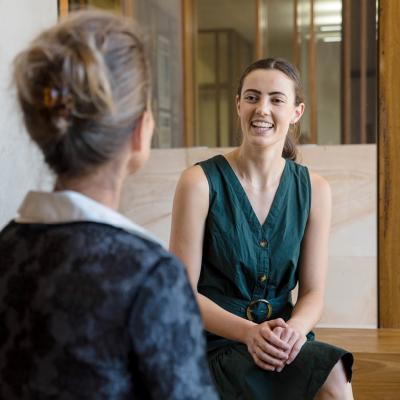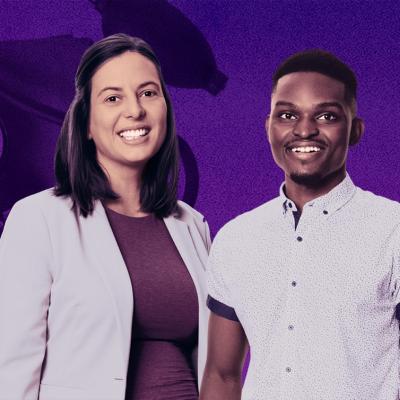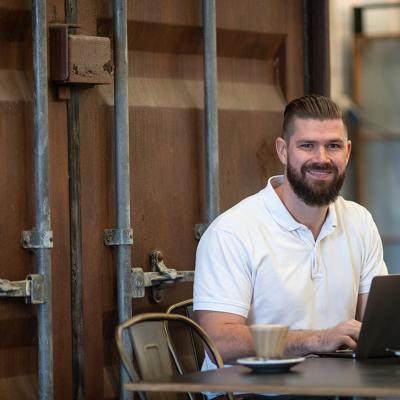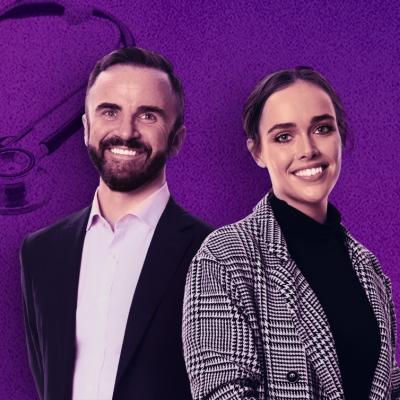Master of Audiology Studies student Miriam Verghese shares experiences from her degree and the reasons she decided to study audiology at The University of Queensland.
Why did you decide to study audiology?
I’ve always wanted to work in the healthcare field and help individuals enhance their quality of life, but with so many options I was unsure of what to pursue. During my last semester of my undergraduate degree, I volunteered with Make-A-Wish where I was matched with a child who had an outer ear disorder. Meeting her and hearing her story piqued my interest in audiology. After doing more research in the area, my passion for making a difference in others’ lives through their hearing developed. I saw audiology as not only a way to help others preserve, manage, and improve their hearing and communication, but also as a way for them to regain their confidence.
What prior study had you done before enrolling in audiology at UQ?
Before enrolling in the Master of Audiology Studies at UQ, I completed a Bachelor of Science degree with a double major in biological sciences and psychology in Canada. As many high school students can agree, trying to figure out what to study at university can be a challenging and daunting task. At the time, I was unsure as to what career path I wanted to pursue, so I decided to choose a general degree in science to keep my options open while also exploring my interests. Throughout my undergrad, I discovered an interest in allied health which ultimately led me to audiology.
What does a day in the life of an audiology student look like?
An audiology student’s day varies throughout the program.
- The first year of the degree places a greater emphasis on theoretical knowledge. Lots of time is spent on campus, as it allows us to gain the fundamentals while also giving us a sample of hands-on experience via school screenings, observations, practicals, and a simulation clinic.
- The second and final year allows us to take our knowledge and use it to further develop our practical skills. Every opportunity we have to get direct experience allows us to establish ourselves as future audiologists. This year includes classes, industry placements at various hospitals or clinics, school screenings, and simulations.
"Weekends and weekdays without course delivery allows for a good school-life balance. This gives us time to go to the library and study with classmates, or grab a bite to eat with friends."
What’s the most unexpected thing you’ve learnt while studying audiology at UQ?
When starting my master’s degree at a new university from undergrad, I was happily surprised to find out how supportive the cohort was. By being a part of a smaller class of students, we all had the same mindset of learning: learn together and learn from one another. It was an unexpected shift from undergrad, but it allowed for deeper friendships to be built and for the first year to go by very quickly. Now, going into my final year, I’ve learned the importance of embracing my time at university (both inside and outside of class) to make the most out of my time in Australia.
What are the most valuable skills you’ve learnt while studying audiology?
I have learned many practical skills while studying audiology which will benefit my career. However, the most valuable skill I’ve learned thus far is collaborating with individuals of different backgrounds and perspectives than myself. Being able to develop the interpersonal skills to work with colleagues who have differing ideas is crucial as an audiologist. There are often times when you may be collaborating with a team of interdisciplinary health professionals. However, being able to cooperate with others has its benefits outside of a professional setting as well. Being able to work well with others with different life experiences than you can benefit all relationships that you have. It’s a great way to grow in empathy.
What have you learnt about yourself since you began to study audiology at UQ?
One thing I’ve learned about myself since undertaking a master’s program in audiology is the extent of my capability. From moving to a new country by myself and completing my first year of audiology, I’ve learned a lot about the fine line of managing my personal, social, and academic life. I’ve overcome various challenges which have encouraged me to delve deeper into valuable skills such as perseverance and dedication.
"Seeing how far I’ve come in just a year has proven to me that I am capable of more than I thought was possible during my time as an undergraduate student."
How have your teachers had a positive impact on your studies?
The professors and clinical educators at UQ have made a notably positive contribution to my time here as an audiology student. The wealth of knowledge they have and are willing to pass on to us is very valuable.
- The professors are leading experts in their field, which makes the learning experience very enriching.
- They bring along guest lecturers who are also specialists with unique experiences and knowledge that allows us as students to see different perspectives into the industry.
- The clinical educators are very skilled and thoughtful, doing their best to make sure you are prepared with the practical skills before beginning your career as an audiologist.
What’s one of the most valuable aspects of studying Audiology at UQ?
UQ offers a wide range of resources to its students, and I would consider this as one of the most valuable aspects of studying audiology here. In the audiology program there is wide access to many different articles and books via the library database. In addition to this, the teaching staff themselves are a valuable source with their plethora of knowledge. Another helpful point of contact are the other students within the cohort, who support one another while getting through the program together. A great resource to work on practical skills is the practice rooms, which allow us to spend extra time developing whichever technical skills we feel need the most improvement.
Is audiology a hard field to study? What advice would you give a student who isn’t sure how to study audiology?
Like any field, audiology has its own set of challenges for different individuals. Depending on your background, you may find certain aspects of audiology demanding. For some, the interpersonal relationships are difficult, while for others it’s the technical side. However, I think if you are willing to put in the work, ask questions, and learn from your professors and your peers, the process is smoother.
I found that studying with a group of friends was the most beneficial for me. Going over previous exam papers and understanding how my peers were processing questions and answering them gave me insight into how I can go about problem solving. However, each student is different, so it is important to take time to learn your own studying style.
Hearing Australia’s Aboriginal and Torres Strait Islander audiology scholarship is available to students enrolled in the Master of Audiology Studies at UQ. Learn more.
How have you found studying in an interprofessional environment, with students from different allied health disciplines?
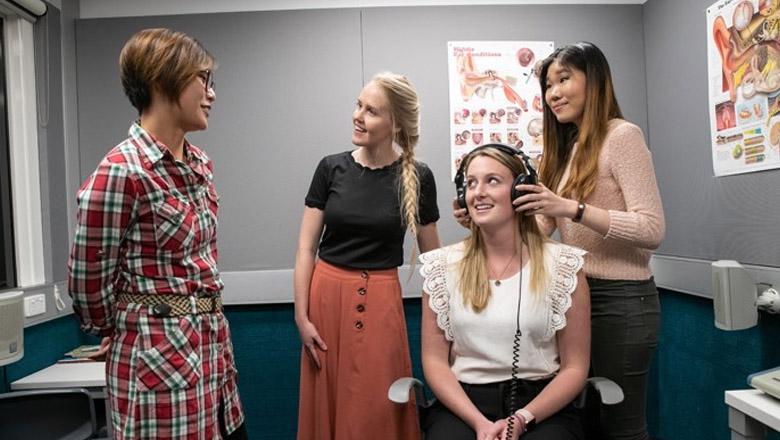
Working on an interdisciplinary team has allowed me to understand different perspectives and the roles that other allied health professionals have. It’s quite interesting to see how different people can have very different thoughts and ideas as to how to go about working together in a group just by their field of study. Gaining a better understanding of other allied health careers is helpful for broadening one’s perspective, which will be beneficial in the future for greater coordination of care.
Many times patients come in with more than one comorbidity, and being able to talk to and work alongside other allied health professionals during this time will allow us to better care for the client. For example, in paediatric audiology, there is a great importance put on the community that the child dwells in. To ensure the family and the child is supported, many different healthcare fields come together to help, which may include speech pathologists, occupational therapists, doctors, and other professionals.
"The audiologist is one beam in the supporting framework to help the patient."
How have the facilities at UQ helped shape your experience of studying audiology?
The University of Queensland has many facilities that have helped shape my experience. The most significant one for me would be the UQ Audiology Clinic. Having the clinic right on campus allows students to spend extra time practising clinical skills so that when we get to real-life situations we are better equipped. The clinic also gives us access to clinical educators who are amazing audiologists.
Check out the UQ Audiology Clinic for yourself with a virtual tour.
The fitness centre is a great facility to help get your mind off of classes. Exercise is always a great way to keep fit, both mentally and physically.
The library is also a wonderful place to go when you need quiet study times. Booking library rooms with friends and studying together has definitely helped me in my studies. The library has an excellent range of materials and resources for all students.
What was your favourite experience while being on placement?
I’ve thoroughly enjoyed my placements thus far and consider them my favourite part of the program. Seeing how excited the clients are to hear sounds they haven’t heard in a long time truly gives a sense of purpose for this career. I’ve enjoyed meeting the clients and hearing their stories, knowing that what I’m doing is helping people in their everyday life. This feels more meaningful rather than simply reading about textbook cases.
My most memorable experience while on placement was when a client relayed his story of wearing hearing aids for the first time in many years. While he had gotten by with his hearing loss for many years, he expressed a desire to start using hearing aids again so he could better understand his world. After being fit with the aids, he returned home where he was greeted by his cat and a rather surprising discovery. While he had once thought his cat was completely quiet, it turned out the open-mouthed sound of silence was actually that of a screeching animal.
Where do you want to go or what do you want to do in your audiology career?
In audiology, there are many different fields that you can work in, some of which include:
- vestibular testing
- paediatric
- educational
- diagnostic
- rehabilitation.
There are also several places where you can practise these services, such as hospitals, private clinics, outreach programs and public clinics to name a few. So far I’ve had experiences with some of these different environments, and I’m hoping in my last year of studying I will be able to narrow down and focus my interests in one of these fields. I would like to keep an open mind to the possibilities in what I can do, but I feel there is no shortage of options for me to pursue.
Want to study audiology just like Miriam? Learn more about UQ’s Master of Audiology Studies.

